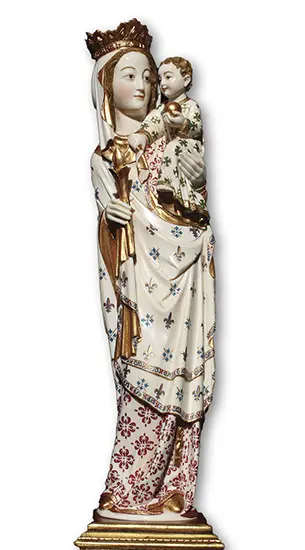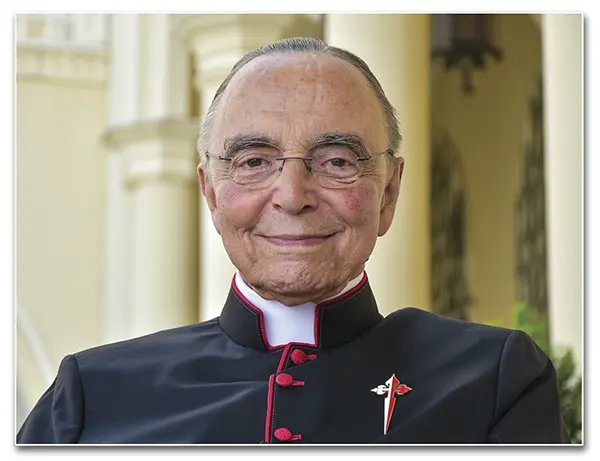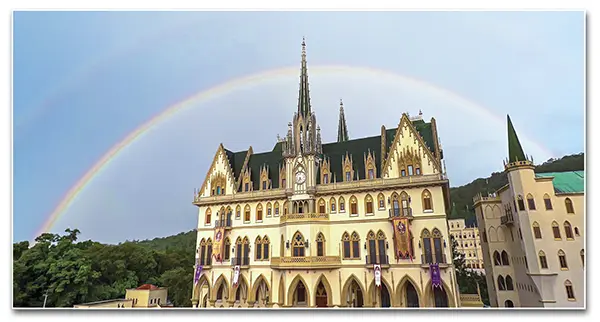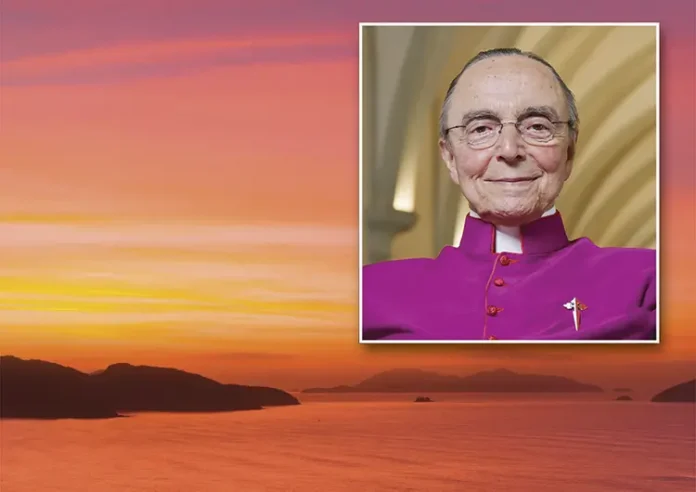“I hope that, despite my miseries, the Sacred Eucharistic Heart of Jesus, Our Lady, St. Joseph, my Guardian Angel, Dr. Plinio, Dona Lucilia, and all my intercessors will help me and do in me, with me, and beyond me all that I should do to fulfil my mission entirely.
“And I hope for – and have always desired – a serene death full of consolation; as I believe I will be able to see, at the moment of death, that the work has flourished, and will endure through the centuries and millennia until the end of the world.”1
It was January of the year 2000. One of the spiritual sons of the then Mr. João Clá, eager to partake in the designs and perspectives that filled the heart of his founder, took advantage of the atmosphere of intimacy created during a meal to ask him about his hopes for himself in the future.
The answer was simple, quick and without hesitation. However, today those words take on the character of a prognostication already fulfilled.
A serene and gradual sunset
Looking back on Msgr. João’s journey over the course of his eighty-five years, one sees how many battles he won, how many challenges he overcame, how many arduous missions he carried out with complete success! Like a star traversing the firmament from one end to the other, he illuminated history, leaving behind him the indelible trail of a fascinating, mysterious and admirable personality.
How was, then, the serene twilight of this luminary, whose existence was a reproach to the wicked (cf. Wis 2:14) and a mainstay for godliness in an age of wickedness (cf. Sir 49:3)?
Just as the sun casts its most beautiful rays when it sets, painting the horizon with radiant colours, so too were Msgr. João’s last months on this earth the corollary and quintessence of his entire life.
Weakened by a stroke – a cerebrovascular accident – suffered fourteen years earlier, but remaining always cheerful, he began slowly and solemnly to withdraw, lessening his attendance at public occasions over time, and decreasing the tireless contact he had kept up with his spiritual children. Even this way of proceeding manifested his invariable consideration for others, as he gradually accustomed them to his absence so that his passing would be less painful.
On the evening of June 2, 2024, at the time when he would usually retire, he surprised those who were attending him with a request to proceed to his private chapel. Once there, he settled into an armchair and remained awake the whole night, until at dawn he asked for the first Mass of the day to be celebrated.
What happened during that silent but most eloquent colloquy with Jesus in the Blessed Sacrament? Was it a sort of “vigil of arms”? Did he sense that his life was coming to an end? Or rather, that his journey was about to begin?
Perhaps we will only know on Judgement Day or in eternity, but what is certain is that during that unforgettable night-watch he appeared serene and joyful, like someone who had received wonderful news.
Joy and affection amid suffering
A week after this episode, Msgr. João took to his bed, never to rise again. Initially struck down with pneumonia, his health deteriorated over the months, with slight improvements and new complications, the ups and downs inherent to such a delicate situation.
Innumerable sufferings, great and small, assailed him: exhaustion, thirst and privation of oral nourishment, digestive disturbances, immobility, sleepless nights, difficulty breathing, frequent choking, constant changing of needles and bandages…
Amidst so many discomforts, he never uttered a complaint or a lament, nor did he even inquire about the causes of his illness or the prognosis for recovery. Rather, he accepted everything as if it were happening to a third party; actually, with less interest, because if it were someone else’s suffering, he would have been truly concerned, with his usual solicitude in relation to others.
Throughout the five months he remained bedridden, there were countless expressions of affection towards his children. Whether through a gaze, a smile or a squeeze of the hand, or taking an interest in their occupations or ensuring that they fulfilled their duties of piety, he invariably expressed contentment with their presence.
Those who knew Msgr. João know that it was the heart of a father that beat in his breast, vibrant with love for the good of others. And this desire to sanctify souls was translated, above all, into the desire – a characteristic trait of his spirituality – to convince them that they were loved by God. Realizing that he would soon depart, he certainly sought to make the most of the time he had left to demonstrate this, with greater intensity than in the years since his stroke.
His expressive eyes also acquired a new depth, in two senses: both in the perceptibility of his vast interior horizon and in the penetrating manner he looked upon those around him. It was enough for someone to cross the threshold of his room to be immediately enveloped by the affability of that gaze, which seemed to want to instil goodness, bringing to mind a comment by Dr. Plinio about him:
“You have very large eyes and, when you open them, you tend to open them very wide. Only those who have endured long periods of solitude do so. […] In your case, whenever the best movements of your soul occur, you open them entirely.”2

The statue Msgr. João venerated on October 30
Jesus in the Blessed Sacrament and Mary, until the end!
However, while Msgr. João analysed everything that happened around him, his attention was intensified when the Holy Sacrifice was celebrated each day in his room. Even when tired or sleepy, or even afflicted by some malaise, he never forfeited the Mass, sometimes repeating the prayers with the celebrant, other times accompanying the hymns. And his fervour increased as the Communion time approached…
The Eucharistic faith acquired by little João in his encounter with the Blessed Sacrament exposed when he was four years old, which was later strengthened by the graces of First Communion and confirmed in 1956 by his resolve never to miss a Communion in his life, now reached its fullness. And Providence, perhaps wishing to seal this alliance, arranged for him to receive the Sacred Species for the last time on October 31, the date that marked the seventy-sixth anniversary of his First Communion!
On the eve of that day, at twilight, Msgr. João turnd at a certain moment toward his left and, pointing with a nod of his head to one of the numerous statues of Our Lady that adorned the walls of his room, exclaimed in a loud voice: “Mary!” The image he indicated was brought to him, and he contemplated it for a long while, kissing it several times.
A few hours later, he repeated the same request and kissed the image again with devotion. Finally, he raised his bed until he was practically in a sitting position and kept his eyes wide open, remaining like this throughout the night and the following day, without even dozing off.
On the morning of the 31st, when greeted by one of his attendants, he tried to respond with “Salve Maria”, but his voice failed and he could only manage to articulate a faint “Maria”. The name of the Mother of God would thus be his last word… A beautiful summary of a life consumed in love for the Virgin of virgins, expressed by a soul who, on earth, only “breathed” Mary!3
However, far from being merely the end of his journey, by pronouncing her name, Msgr. João bequeathed his testament to the work he had founded and left behind him “an open door, which no one is able to shut” (Rv 3:8): only in union with the Mother of mercy will we follow the paths of virtue and thus prepare ourselves for Heaven!
Finally… at the very limit!
That same day, the 31st – which would be his last – passed as was usual during those final months, with the difference that Msgr. João communicated little. He attended Holy Mass with his customary devotion.
After midnight, as the first hours of November 1 began to unfold, Msgr. João showed signs that his body, which he had so willingly exerted in his dedication to the ideals of the Church, was expending its last energies.
Spiritual sons and daughters surrounded his bed, desiring that he might depart from their arms to those of Our Lady, and pass from the manifestations of filial tenderness to the effusions of the infinite torrent of love from the Sacred Hearts of Jesus and Mary.
Msgr. João’s expression was one of unalterable serenity, showing at the same time how fully conscious he was and how he could hear everything that was said to him.
This peace, in turn, radiated to all present: there was no sign of discouragement from those around him, no uncontrolled sobbing, no frantic agitation. There reigned, instead, an atmosphere of solemn recollection, of balanced and respectful emotion.
It then occurred to one of his priest sons to celebrate the Holy Sacrifice. Everything was immediately organized and Mass began. It is even difficult to specify the exact moment when his soul left his body, such was the gentleness with which he faded away, like a wick that, as it burns, melts the wax entirely.
At the Offertory, however, while the celebrant prepared the bread and wine, offering to the Father the species that would be transubstantiated into the Body and Blood of Our Lord Jesus Christ, his presence was no longer felt among them …
Considering the grandeur of this moment, the filial tongue is at a loss for adequate terms, and turns, once again, to the words of Dr. Plinio, spoken several decades earlier:
“One of the best traits of our dear João’s soul is this: there is something immeasurable about him, but immeasurable in a healthy way, immeasurable in a splendid way. […] He is always – and how I admire this position – at the extreme limits of himself.
“‘The measure of loving God,’ said St. Bernard, ‘consists in loving Him without measure.’4
We really ought to have something unlimited, something that is constantly pointing to an extreme limit that we never reach but towards which we must always strive, and which we will only have reached when, upon breathing our last breath, we first kiss Our Lady’s feet.”5
Yes, the soul of Msgr. João – great, immense, almost boundless and always effervescent with love – had finally reached that “extreme limit”! Or rather, the boundless vastitudes of eternity, for which he had so longed on this earth, had opened before him!
“Saudades”: the pinnacle of human vision, bringing us closer to divine vision
According to the superficial, positivist and pragmatic vision of the modern world, everything would seem to be over. He who had been a sun to his children and had shone before their eyes with the intensity of midday had disappeared into a seemingly dark and hopeless horizon…

What remained? A void impossible to fill? How would his disciples fare without the joyful and lively presence of their beloved guide? Would his work, built at the cost of so many sacrifices, fade away for lack of the unparalleled impulse that only he was capable of providing?
For those who knew Msgr. João, it is easy to find the answer to such questions, for if, on one hand, it is true that, in the words of Scripture, “The righteous man who had died will condemn the ungodly who are living” (Wis 4:16), it is also certain – and even more so – that “the fruit of noble struggles is a glorious one; and unfailing is the root of understanding” (Wis 3:15).
Although that light seemed to have waned inexorably, there remained a warmth of soul full of longings; there remained the strength and vitality that he had so efficaciously spread; there remained so many other torches, lit by the fire of his spirit, which would continue to burn, intent on inflaming the face of the earth with a fire of love.
Thus, when the faint glimmers of dawn on that first Friday of November began to pierce the darkness of night, the gentle voice of grace whispered in the hearts of all, in unison: “God did not make death, and He does not delight in the death of the living. […] For righteousness is immortal” (Wis 1:13, 15).
Having accompanied their father in his suffering, it was now imperative for all the sons and daughters who wanted to be faithful to follow him beyond the vastness that separates time and eternity, and to climb the heights of the supernatural perspective, with their gaze toward the future, as he had taught them:
“For man, there exists the past, the present and the future, but in God there is no past or future; everything is present.
“One way for man to participate in this divine perspective, in which the past and the future unite, lies in the summation of a memory of the past, of a contentment with the present, but above all, of the hope and expectation of an unending fulfilment of that which is to come, in a perpetual and eternal synthesis.
[…] “True saudade, with a capital ‘S’, is much more turned towards the future than the past, and it gives man the possibility of participating, already in this life, in the joys of eternity. So saudade is a kind of pinnacle of human vision, one which best represents God’s vision of all realities.”6
An arc spanning time and eternity
On the afternoon of that unforgettable November 1, 2024, just after the first official funeral ceremony had ended, a bright rainbow appeared in the sky, framing the Basilica of Our Lady of the Rosary where Msgr. João’s body was lying in repose.
Was this a pleasant surprise prepared by him to console the children he loved so much? A sign of Providence showing them the new form of communication they should establish with their father, the means of shortening the distance by spanning an arc between time and eternity?

A view of the rainbow that formed in the sky after the first funeral ceremony
Words spoken by Msgr. João himself in 2002, on the occasion of a farewell, answer these questions and are now more relevant than ever, like a guarantee and an affectionate promise:
“We will all die, but death will be the condition for us to live together eternally […], in the contemplation of God face to face, and in the love of God above all things, loving Him as He loves Himself and loving one another all the more, because of our love for Him and our understanding of Him.
“So instead of being sad at the time of parting, we should rejoice, […] for we are drawing nearer to the day when there will be no morning, no evening, and no night, but only eternity together.
“May Our Lady sanctify you in my absence, so that, when I return, I may find you all even more prepared to be a source of rest, joy and satisfaction to me.”7 ◊
Notes
1 CLÁ DIAS, EP, João Scognamiglio. Conversation. São Paulo, 2/1/2000.
2 CORRÊA DE OLIVEIRA, Plinio. Conversation. São Paulo, 3/12/1978.
3 Cf. ST. LOUIS-MARIE GRIGNION DE MONTFORT. Traité de la vraie dévotion à la Sainte Vierge, n.217. In: Œuvres Complètes. Paris: Du Seuil, 1966, p.634.
4 ST. BERNARD OF CLAIRVAUX. Tratado sobre el amor a Dios, c.VI, n.16. In: Obras Completas. 2.ed. Madrid: BAC, 1993, v.I, p.323.
5 CORRÊA DE OLIVEIRA, Plinio. Conversation. São Paulo, 7/8/1980.
6 CLÁ DIAS, EP, João Scognamiglio. Conversation. Ubatuba, 27/7/2004.
7 CLÁ DIAS, EP, João Scognamiglio. Conversation. Mairiporã, 11/9/2002.


